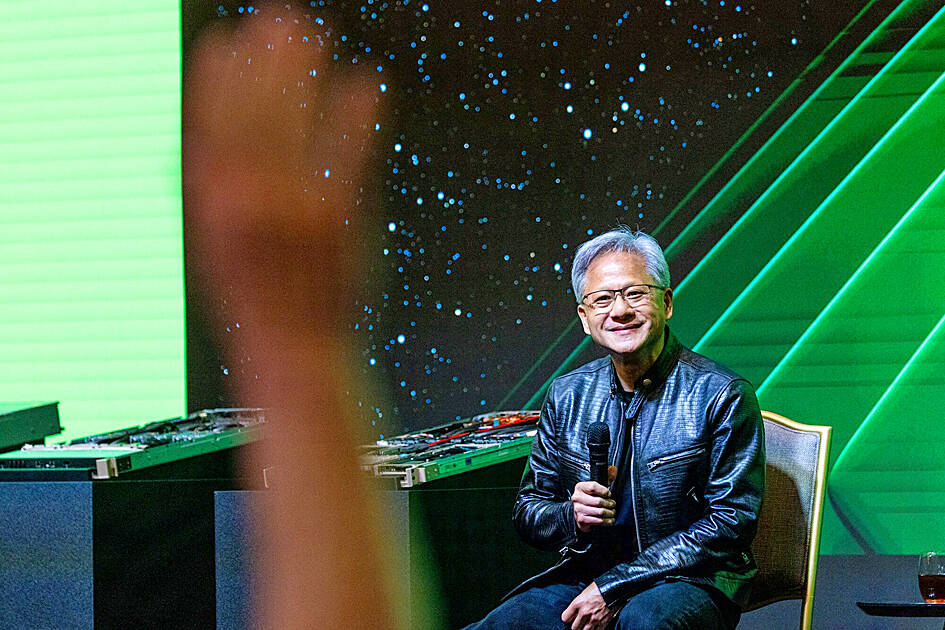Artificial intelligence (AI) chip giant Nvidia Corp yesterday said it is working on a number of new investments in Taiwan, including a second supercomputer center and possibly a corporate headquarters, given the company’s strong ties to the local semiconductor ecosystem.
Nvidia plans to build a supercomputer center like the “Taipei-1” project in Kaohsiung, CEO Jensen Huang (黃仁勳) said at a news conference in Taipei.
No final decision about the location has been made yet, he said.

Photo: Annabelle Chih, Bloomberg
Nvidia is also considering setting up headquarters in Taiwan, he said.
“If you can find me a nice plot of land, I can build a headquarters here in Taipei,” Huang said, adding that Nvidia employs hundreds of workers in Taipei and nearby areas.
The strong local ecosystem is one of the major factors behind Nvidia’s decision to invest more in Taiwan, Huang said.
For instance, Taiwan Semiconductor Manufacturing Co (TSMC, 台積電) is a significant partner of Nvidia, given the chipmaker’s advanced manufacturing technology and chip-on-wafer-on-substrate (CoWoS) packaging technology, as well as its good work ethic and flexibility, he said.
Taiwan also has “incredible” chip testing house and hardware system makers from Foxconn Technology Group (富士康科技集團) to Quanta Computer Inc (廣達電腦) and Wiwynn Corp (緯穎科技) and a lot more, he said.
Huang on Monday night said that Nvidia planned to recruit about 1,000 engineers in Taiwan over a five-year period for chip design, system design and software engineering.
The company has already built a significant AI team in Taiwan and plans to build a data center here as the nation’s expertise in AI research is very good, he said.

INVESTIGATION: The case is the latest instance of a DPP figure being implicated in an espionage network accused of allegedly leaking information to Chinese intelligence Democratic Progressive Party (DPP) member Ho Jen-chieh (何仁傑) was detained and held incommunicado yesterday on suspicion of spying for China during his tenure as assistant to then-minister of foreign affairs Joseph Wu (吳釗燮). The Taipei District Prosecutors’ Office said Ho was implicated during its investigation into alleged spying activities by former Presidential Office consultant Wu Shang-yu (吳尚雨). Prosecutors said there is reason to believe Ho breached the National Security Act (國家安全法) by leaking classified Ministry of Foreign Affairs information to Chinese intelligence. Following interrogation, prosecutors petitioned the Taipei District Court to detain Ho, citing concerns over potential collusion or tampering of evidence. The

Seventy percent of middle and elementary schools now conduct English classes entirely in English, the Ministry of Education said, as it encourages schools nationwide to adopt this practice Minister of Education (MOE) Cheng Ying-yao (鄭英耀) is scheduled to present a report on the government’s bilingual education policy to the Legislative Yuan’s Education and Culture Committee today. The report would outline strategies aimed at expanding access to education, reducing regional disparities and improving talent cultivation. Implementation of bilingual education policies has varied across local governments, occasionally drawing public criticism. For example, some schools have required teachers of non-English subjects to pass English proficiency

‘FORM OF PROTEST’: The German Institute Taipei said it was ‘shocked’ to see Nazi symbolism used in connection with political aims as it condemned the incident Sung Chien-liang (宋建樑), who led efforts to recall Democratic Progressive Party (DPP) Legislator Lee Kun-cheng (李坤城), was released on bail of NT$80,000 yesterday amid an outcry over a Nazi armband he wore to questioning the night before. Sung arrived at the New Taipei City District Prosecutors’ Office for questioning in a recall petition forgery case on Tuesday night wearing a red armband bearing a swastika, carrying a copy of Adolf Hitler’s Mein Kampf and giving a Nazi salute. Sung left the building at 1:15am without the armband and apparently covering the book with a coat. This is a serious international scandal and Chinese

TRADE: The premier pledged safeguards on ‘Made in Taiwan’ labeling, anti-dumping measures and stricter export controls to strengthen its position in trade talks Products labeled “made in Taiwan” must be genuinely made in Taiwan, Premier Cho Jung-tai (卓榮泰) said yesterday, vowing to enforce strict safeguards against “origin laundering” and initiate anti-dumping investigations to prevent China dumping its products in Taiwan. Cho made the remarks in a discussion session with representatives from industries in Kaohsiung. In response to the US government’s recent announcement of “reciprocal” tariffs on its trading partners, President William Lai (賴清德) and Cho last week began a series of consultations with industry leaders nationwide to gather feedback and address concerns. Taiwanese and US officials held a videoconference on Friday evening to discuss the